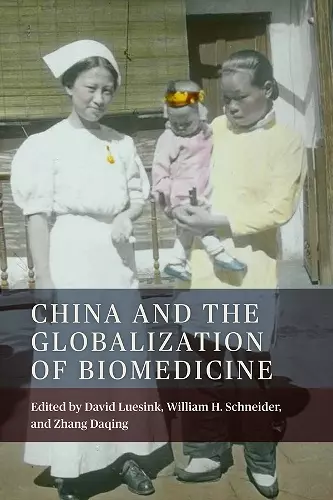China and the Globalization of Biomedicine
David Luesink editor Zhang Daqing editor Professor Emeritus William H Schneider editor
Format:Hardback
Publisher:Boydell & Brewer Ltd
Published:15th May '19
Currently unavailable, and unfortunately no date known when it will be back

Argues that developments in biomedicine in China should be at the center of our understanding of biomedicine, not at the periphery Today China is a major player in advancing the frontiers of biomedicine, yet previous accounts have examined only whether medical ideas and institutions created in the West were successfully transferred to China. This is the firstbook to demonstrate the role China played in creating a globalized biomedicine between 1850 and 1950. This was China's "Century of Humiliation" when imperialist powers dominated China's foreign policy and economy, forcing it to join global trends that included limited public health measures in the nineteenth century and government-sponsored healthcare in the twentieth. These external pressures, combined with a vast population immiserated by imperialism and the decline of the Chinese traditional economy, created extraordinary problems for biomedicine that were both unique to China and potentially applicable to other developing nations. In this book, scholars based in China, the United States, and the United Kingdom make the case that developments in biomedicine in China such as the discovery of new diseases, the opening of the medical profession to women, the mass production of vaccines, and the delivery ofhealthcare to poor rural areas should be at the center of our understanding of biomedicine, not at the periphery. CONTRIBUTORS: Daniel Asen, Nicole Barnes, Mary Augusta Brazelton, Gao Xi , He Xiaolian, Li Shenglan, David Luesink, William H. Schneider, Shi Yan, Yu Xinzhong, DAVID LUESINK is Assistant Professor of History at Sacred Heart University. WILLIAM H. SCHNEIDER is Professor Emeritus of History and Medical Humanities at Indiana University Purdue University Indianapolis. ZHANG DAQING is Professor and Director, Institute of Medical Humanities at Peking University in Beijing.
In summary, this volume provides a fascinating illustration of the diversified biomedical field in modern China, solidly anchored in both global and Chinese contexts. It also engages with serious historiographical endeavours to decentralize the West and to grapple with the tension between global modernity and local practice, which will benefit readers from a broad humanities and social sciences. -- H-Net Reviews
ISBN: 9781580469425
Dimensions: unknown
Weight: 632g
288 pages